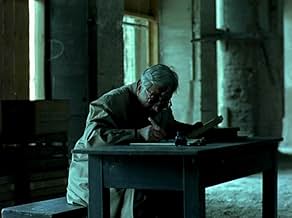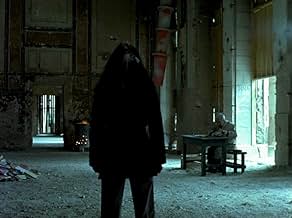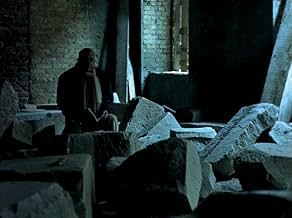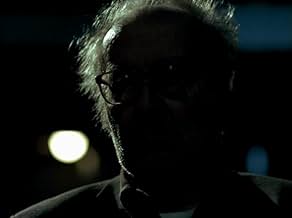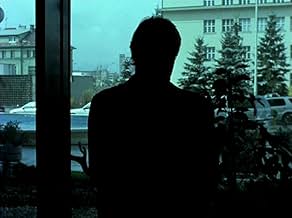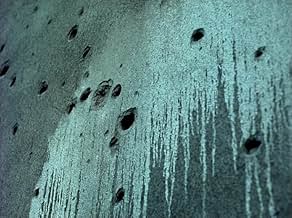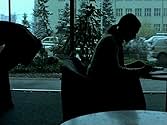Notre musique
- 2004
- 1h 20m
ÉVALUATION IMDb
6,8/10
3,2 k
MA NOTE
Ajouter une intrigue dans votre langueAn indictment of modern times divided into three "kingdoms": "Enfer" ("Hell"), "Purgatoire" ("Purgatory") and "Paradis" ("Paradise").An indictment of modern times divided into three "kingdoms": "Enfer" ("Hell"), "Purgatoire" ("Purgatory") and "Paradis" ("Paradise").An indictment of modern times divided into three "kingdoms": "Enfer" ("Hell"), "Purgatoire" ("Purgatory") and "Paradis" ("Paradise").
- Prix
- 1 victoire et 6 nominations au total
Avis en vedette
I've just come back from the cinema and it's raining very hard. But there's the sun, too, which is going down behind the mountains. It's very poetic. But not nearly as poetic as Jean Luc Godard's last film, "Notre Musique".
The movie is divided into three kingdoms: 1 - Enfer, 2 - Purgatoire and 3 - Paradis. The first part of the movie consists in a collage of various war images and situations accompanied by a wonderful music. Some very clever sentences are said off screen, too. "Death can be seen in two different ways: as the possible of the impossible or as the impossible of the possible". The second part shows us the crossed stories of some peoples meeting in Sarajevo for the Book Weeks: J. L. Godard himself, a young Israeli Journalist, a Palestinian and a Spanish poets, A young Hebrew girl with Russian origins, a Hebrew translator with Egyptian origins, some American natives, some natives of Sarajevo and other people speak about their experiences, they wishes, war, peace, poetry, history, life, death, cinema, reconciliation. J.L. Godard gives a lecture to some cinema students and shows them photographs. The third part takes place in paradise and shows us a girl who has been killed in a cinema by Israeli snipers who suspected her of being a terrorist ready to kill herself. She had a red bag with her and people thought it contained a bomb. In fact there were just books in it. The girl wanders near a river and encounters an American marine. Some boys are playing and reading books. Paradise is fenced and guarded by U.S. military forces.
This movie is truly amazing. In fact it is not just a film, it is poetry. In moments like these when cinema industry is dominated by fast, brainless, action-packed movies, it is a real pleasure and mind-freeing experience to see something that beautiful and poetic. This was presented this year in Cannes and didn't get much attention if I remember right. A journalist of "Le Nouvel Observateur" who usually gives very good advices, this time got it wrong saying that "Notre Musique" is a senile work. Not at all. It's the work of a director who has only improved with years and who has reached total serenity and great wisdom. This film does not give you ready-made, simple answers to common questions, it gives you some points which are incredibly interesting to develop and think about. Sarajevo is the ideal place where peoples, histories and cultures mix and sometimes sadly clash. When the young girl is asked "Why Sarajevo?" the touching answer she gives is "Because Palestine. I come from Tel Aviv and wanted to see a place where people can get along in harmony". There's so much to think about this movie. And everything is filmed so well, so limpidly, with such a mastery, you can't stop staring at the screen. "Godard is the only film director in the world" (Freddy Buache)
The movie is divided into three kingdoms: 1 - Enfer, 2 - Purgatoire and 3 - Paradis. The first part of the movie consists in a collage of various war images and situations accompanied by a wonderful music. Some very clever sentences are said off screen, too. "Death can be seen in two different ways: as the possible of the impossible or as the impossible of the possible". The second part shows us the crossed stories of some peoples meeting in Sarajevo for the Book Weeks: J. L. Godard himself, a young Israeli Journalist, a Palestinian and a Spanish poets, A young Hebrew girl with Russian origins, a Hebrew translator with Egyptian origins, some American natives, some natives of Sarajevo and other people speak about their experiences, they wishes, war, peace, poetry, history, life, death, cinema, reconciliation. J.L. Godard gives a lecture to some cinema students and shows them photographs. The third part takes place in paradise and shows us a girl who has been killed in a cinema by Israeli snipers who suspected her of being a terrorist ready to kill herself. She had a red bag with her and people thought it contained a bomb. In fact there were just books in it. The girl wanders near a river and encounters an American marine. Some boys are playing and reading books. Paradise is fenced and guarded by U.S. military forces.
This movie is truly amazing. In fact it is not just a film, it is poetry. In moments like these when cinema industry is dominated by fast, brainless, action-packed movies, it is a real pleasure and mind-freeing experience to see something that beautiful and poetic. This was presented this year in Cannes and didn't get much attention if I remember right. A journalist of "Le Nouvel Observateur" who usually gives very good advices, this time got it wrong saying that "Notre Musique" is a senile work. Not at all. It's the work of a director who has only improved with years and who has reached total serenity and great wisdom. This film does not give you ready-made, simple answers to common questions, it gives you some points which are incredibly interesting to develop and think about. Sarajevo is the ideal place where peoples, histories and cultures mix and sometimes sadly clash. When the young girl is asked "Why Sarajevo?" the touching answer she gives is "Because Palestine. I come from Tel Aviv and wanted to see a place where people can get along in harmony". There's so much to think about this movie. And everything is filmed so well, so limpidly, with such a mastery, you can't stop staring at the screen. "Godard is the only film director in the world" (Freddy Buache)
Some film critics, like Stuart Klawans of "The Nation" magazine, Desson Thomson of "The Washington Post," and Manohla Dargis of "The New York Times," have hailed this latest effort from Godard, the undisputed giant of the French New Wave, in glowing terms. I think it's a sloppy little film that wouldn't have seen the light of the big screen thousands of miles from home were it not for the fact that it was made by a legendary director.
"Notre Musique" is divided into three sections: the first (12 minutes) is subtitled "Kingdom 1 Hell" and the last (6 minutes) is called "Kingdom 3 Heaven." The long middle section (62 minutes) is "Kingdom 2 Purgatory." "Hell" is a montage depicting scenes of war battles and the carnage that is created by war - made of clips from documentary archival footage and fictional feature films. "Heaven" is a contemporary shoot in a lush park-like setting next to a lake, where it's peaceable and sunny, a lovely stream meanders through, and a few people frolic about. Both of these brief sequences could easily have been made by film school students.
It's difficult to describe the main middle section. It takes place at an international conference in Sarajevo of intellectuals, literati, journalists, diplomats and arts people. Was it an actual conference or something staged for the film? You can't tell just from watching. Several well known people play themselves, including Godard. But mixed in among them are actors playing roles of people given other names.
There's lots of talk. A number of big ideas are casually put on the table, some intriguing but entirely unexplored (example: "killing a man to defend an idea isn't defending an idea, it's killing a man"), some certainly questionable or debatable (examples: "humane people don't start revolutions, they start libraries or cemeteries," or "if the house is already on fire, it's foolish to try to save the furniture"), others simply false on the face of it (example: "The only serious philosophical problem is suicide").
There are allusions to the Nazis; to the destruction - during the Bosnian war - and recent reconstruction of the nearby ancient Mostar Bridge, first built in 1566; to the perennial middle east problem of Palestine and Israel; to the seeming universality of man's inhumanity to man (example: Native Americans in full tribal regalia standing solemnly alongside the Mostar Bridge).
There is footage wasted on various moving forms of transportation planes, buses, cars, trains, streetcars and on people getting into and out of cars, like typical filler footage in a third rate TV drama from Burbank, CA. And there are little meaningless toss off scenes, like an impassive waiter serving flutes of wine carefully to six people seated around a table, a scene that segues into another, in which a fat male guest intrusively wraps a hammy arm around a shapely impassive waitress and pushes her through a little faux dance. So what's that all about the well off even intellectuals exploiting working people? Who knows.
The best bits occur in a seminar conducted by Godard himself, about the way in which cinema can portray opposite tendencies in human nature and society, what he refers to as "shot" and "reverse shot." He mentions several such polarities, e.g., certainty vs. ambiguity, victim vs. criminal. Another example: Godard asserts that the story of Jews in Israel is fiction, while the story of the Palestinians is documentary. What does that mean? One wonders.
Well, it's true that a larger-than-life romantic aura has developed around the Israelis and their struggle to secure a homeland over the past 60 years, while we think of Palestinians instead in undramatic, concrete terms of poverty, joblessness, lack of infrastructure, ineffective leadership, and so on.
Regarding cinema, Godard's comments made me think of scenes from the recent propagandistic documentary about Hugo Chavez and Venezuela, "The Revolution Will Not be Televised." In that film there is a sequence in which shots are fired from a bridge into a crowd below. Viewed from one angle, the scene invites the interpretation that opposition snipers are firing on a pro-Chavez crowd, but, viewed from another angle, the opposite conclusion is possible: that Chavez's people are shooting at opposition protesters. What is the truth? Both versions? Neither?
Animating this theme further are two young women who seem also to represent opposites. There is Judith Lerner (played by actress Sarah Adler), an Israeli journalist who chooses to live in Palestine. She has come to Sarajevo because "I wanted to see a place where reconciliation seems possible." Judith is an optimist. On the other hand we have Olga (Nade Dieu) who is depressed and suicidal, despite her comfortable life. She holds herself back from suicide only because she fears pain and the next world. In the end she is shot by marksmen, we are told, and we rejoin her in the final Heaven sequence.
I do agree with Godard that Purgatory could easily be imagined as a place where endless pseudo-intellectual blather keeps confusing and mesmerizing people, to their detriment. It's the sort of place that people who conduct themselves in this manner during life deserve to be stuck in for the hereafter. Talk is cheap and yet sometimes it has the power to move whole nations toward war or self destruction. Is this what he's driving at? Who can tell?
The only basis for recommending this film is that it is the creation of one of the great filmmakers of the last 50 years, and we owe Godard this respect, to observe any new work of his, approaching it soberly and with openness. But we are not required to genuflect to the master, casting a blind eye toward mediocrity. (In French, Arabic, English, Hebrew, Serbo-Croatian & Spanish) My rating: 6/10 (B-). (Film seen on 02/07/05). If you'd like to read more of my reviews, send me a message for directions to my websites.
"Notre Musique" is divided into three sections: the first (12 minutes) is subtitled "Kingdom 1 Hell" and the last (6 minutes) is called "Kingdom 3 Heaven." The long middle section (62 minutes) is "Kingdom 2 Purgatory." "Hell" is a montage depicting scenes of war battles and the carnage that is created by war - made of clips from documentary archival footage and fictional feature films. "Heaven" is a contemporary shoot in a lush park-like setting next to a lake, where it's peaceable and sunny, a lovely stream meanders through, and a few people frolic about. Both of these brief sequences could easily have been made by film school students.
It's difficult to describe the main middle section. It takes place at an international conference in Sarajevo of intellectuals, literati, journalists, diplomats and arts people. Was it an actual conference or something staged for the film? You can't tell just from watching. Several well known people play themselves, including Godard. But mixed in among them are actors playing roles of people given other names.
There's lots of talk. A number of big ideas are casually put on the table, some intriguing but entirely unexplored (example: "killing a man to defend an idea isn't defending an idea, it's killing a man"), some certainly questionable or debatable (examples: "humane people don't start revolutions, they start libraries or cemeteries," or "if the house is already on fire, it's foolish to try to save the furniture"), others simply false on the face of it (example: "The only serious philosophical problem is suicide").
There are allusions to the Nazis; to the destruction - during the Bosnian war - and recent reconstruction of the nearby ancient Mostar Bridge, first built in 1566; to the perennial middle east problem of Palestine and Israel; to the seeming universality of man's inhumanity to man (example: Native Americans in full tribal regalia standing solemnly alongside the Mostar Bridge).
There is footage wasted on various moving forms of transportation planes, buses, cars, trains, streetcars and on people getting into and out of cars, like typical filler footage in a third rate TV drama from Burbank, CA. And there are little meaningless toss off scenes, like an impassive waiter serving flutes of wine carefully to six people seated around a table, a scene that segues into another, in which a fat male guest intrusively wraps a hammy arm around a shapely impassive waitress and pushes her through a little faux dance. So what's that all about the well off even intellectuals exploiting working people? Who knows.
The best bits occur in a seminar conducted by Godard himself, about the way in which cinema can portray opposite tendencies in human nature and society, what he refers to as "shot" and "reverse shot." He mentions several such polarities, e.g., certainty vs. ambiguity, victim vs. criminal. Another example: Godard asserts that the story of Jews in Israel is fiction, while the story of the Palestinians is documentary. What does that mean? One wonders.
Well, it's true that a larger-than-life romantic aura has developed around the Israelis and their struggle to secure a homeland over the past 60 years, while we think of Palestinians instead in undramatic, concrete terms of poverty, joblessness, lack of infrastructure, ineffective leadership, and so on.
Regarding cinema, Godard's comments made me think of scenes from the recent propagandistic documentary about Hugo Chavez and Venezuela, "The Revolution Will Not be Televised." In that film there is a sequence in which shots are fired from a bridge into a crowd below. Viewed from one angle, the scene invites the interpretation that opposition snipers are firing on a pro-Chavez crowd, but, viewed from another angle, the opposite conclusion is possible: that Chavez's people are shooting at opposition protesters. What is the truth? Both versions? Neither?
Animating this theme further are two young women who seem also to represent opposites. There is Judith Lerner (played by actress Sarah Adler), an Israeli journalist who chooses to live in Palestine. She has come to Sarajevo because "I wanted to see a place where reconciliation seems possible." Judith is an optimist. On the other hand we have Olga (Nade Dieu) who is depressed and suicidal, despite her comfortable life. She holds herself back from suicide only because she fears pain and the next world. In the end she is shot by marksmen, we are told, and we rejoin her in the final Heaven sequence.
I do agree with Godard that Purgatory could easily be imagined as a place where endless pseudo-intellectual blather keeps confusing and mesmerizing people, to their detriment. It's the sort of place that people who conduct themselves in this manner during life deserve to be stuck in for the hereafter. Talk is cheap and yet sometimes it has the power to move whole nations toward war or self destruction. Is this what he's driving at? Who can tell?
The only basis for recommending this film is that it is the creation of one of the great filmmakers of the last 50 years, and we owe Godard this respect, to observe any new work of his, approaching it soberly and with openness. But we are not required to genuflect to the master, casting a blind eye toward mediocrity. (In French, Arabic, English, Hebrew, Serbo-Croatian & Spanish) My rating: 6/10 (B-). (Film seen on 02/07/05). If you'd like to read more of my reviews, send me a message for directions to my websites.
This is not entertainment...
I'd seen Contempt (1963) and Breathless (1960) many years ago and thoroughly enjoyed both. After 1964, I sort missed all that he directed until now, which appeared on late-night TV. And no wonder it was on so late at night...
It seems that, as many of us get older and maybe wiser, we like to expound on things philosophical. Bergman did it well, and without resorting to didactic circularity or confusion and still managed to tell a good story. Woody Allen uses satire brilliantly for the same purpose.
However, Godard here uses the bare bones of a simple, quasi-documentary style story and one that it episodically fractured and with much symbolism to reflect upon 'what it all means': that is, life, death and the whole damn thing. Using the current Israeli problem with Palestine and vice-versa, he explores the three concepts of Hell, Purgatory and Heaven, using each to show what humanity has done, what it's doing and where it should be going, respectively.
The first, Hell, is obvious: with a montage of cuts from a multitude of news and film clips, Godard shows us the extent to which we prey upon each other even as we pray for each other. So, there are some real all too real scenes of the dead, the dying and the executed during the many wars that have been documented during the last hundred years or so. Nothing new here at all...
The second, Purgatory (a place for waiting), is well an exposition about waiting: waiting for a bus, for a train, for a plane, for a meeting to start, for a bridge to be rebuilt, for a nation to recover from war, for people to begin to understand each other. And this is all done within the thin framework of the story of Olga (Nade Dieu), the Jewish journalist from Tel Aviv who is attending a lecture by Godard (playing himself) in Sarajevo, and who is trying to understand why human problems cannot seem to be resolved, no matter what. Significantly, by choosing just Olga, Godard has certainly brought his philosophy to a very personal level, and one with which we can all identify, more or less.
All of that is rendered moot when Olga appears to commit an unspeakable act when she returns to Tel Aviv. Perhaps Godard should have told her that it's not the end that matters but the journey to achieve that end?
The third the shortest vignette is our final destination: as a prisoner of Nature, complete with - American! - border guards who let Olga through to join the happy throng. Essentially: strip off civilization and return to our basics to find out who we really are...
I think I'll stick with tackling prejudice, reducing global warming and trying to make a positive difference rather than taking Olga's choice.
It's well filmed, as you'd expect from Godard; the music is, at times, quite beautiful to hear; and the Sarajevo mise-en-scene is a stark reminder of our collective sins. An annoying aspect for me, however, is that not all dialog was translated and subtitled; perhaps it wasn't necessary?
So, while interesting visually and aurally, I'd recommend this only for those who like to reflect upon existential problems within philosophy.
I'd seen Contempt (1963) and Breathless (1960) many years ago and thoroughly enjoyed both. After 1964, I sort missed all that he directed until now, which appeared on late-night TV. And no wonder it was on so late at night...
It seems that, as many of us get older and maybe wiser, we like to expound on things philosophical. Bergman did it well, and without resorting to didactic circularity or confusion and still managed to tell a good story. Woody Allen uses satire brilliantly for the same purpose.
However, Godard here uses the bare bones of a simple, quasi-documentary style story and one that it episodically fractured and with much symbolism to reflect upon 'what it all means': that is, life, death and the whole damn thing. Using the current Israeli problem with Palestine and vice-versa, he explores the three concepts of Hell, Purgatory and Heaven, using each to show what humanity has done, what it's doing and where it should be going, respectively.
The first, Hell, is obvious: with a montage of cuts from a multitude of news and film clips, Godard shows us the extent to which we prey upon each other even as we pray for each other. So, there are some real all too real scenes of the dead, the dying and the executed during the many wars that have been documented during the last hundred years or so. Nothing new here at all...
The second, Purgatory (a place for waiting), is well an exposition about waiting: waiting for a bus, for a train, for a plane, for a meeting to start, for a bridge to be rebuilt, for a nation to recover from war, for people to begin to understand each other. And this is all done within the thin framework of the story of Olga (Nade Dieu), the Jewish journalist from Tel Aviv who is attending a lecture by Godard (playing himself) in Sarajevo, and who is trying to understand why human problems cannot seem to be resolved, no matter what. Significantly, by choosing just Olga, Godard has certainly brought his philosophy to a very personal level, and one with which we can all identify, more or less.
All of that is rendered moot when Olga appears to commit an unspeakable act when she returns to Tel Aviv. Perhaps Godard should have told her that it's not the end that matters but the journey to achieve that end?
The third the shortest vignette is our final destination: as a prisoner of Nature, complete with - American! - border guards who let Olga through to join the happy throng. Essentially: strip off civilization and return to our basics to find out who we really are...
I think I'll stick with tackling prejudice, reducing global warming and trying to make a positive difference rather than taking Olga's choice.
It's well filmed, as you'd expect from Godard; the music is, at times, quite beautiful to hear; and the Sarajevo mise-en-scene is a stark reminder of our collective sins. An annoying aspect for me, however, is that not all dialog was translated and subtitled; perhaps it wasn't necessary?
So, while interesting visually and aurally, I'd recommend this only for those who like to reflect upon existential problems within philosophy.
There are movies to help you relax on a Saturday night and there are movies that stimulate, even if that means asking questions that have no answers. I didn't understand this movie but I still felt stimulated by its questions. I tried so hard to make the connections and I had a lot of trouble. But you don't read Portrait of the Artist as a Young Man once without discussing it and expect to understand it. Nor is the more accessible Three Colors Trilogy meant to be seen only once for complete understanding. The quality of a movie is not determined by its accessibility. It's a limited understanding of the medium to judge film by its accessibility. It can be more than an easy way to relax. It can be the impetus to dialogue. I cared about this movie because I didn't understand it.
Leave it up to Monsieur Godard to shoot his first film to directly address the Palastineans since Ici et ailleurs in '76 in Sarajevo with a cast that includes US Marines, Native Americans in full traditional regalia, and Godard himself in counter-sermonizing flesh. At least, and this is much more than trivial record keeping, the maestro has found a way to render his digital photography as gorgeous as the celluloid variety for which he is well known. The quality of the video images takes Notre Musique miles beyond the wan DV sections in Éloge de l'amour. This is all the more interesting considering his response, during the film's central writer's conference, to a question concerning whether or not digital cameras can save cinema. Godard stares into his DV lense and says nothing; the question cannot have an answer other than the one to be provided, immanently, vis-a-vis the unwinding of our collective species activity. Godard, as always, is best when he resists the unavailing temptation to answer the questions which constitute him as one of the most compelling artists of the 20th Century. Though his autodidactic flights of fancy may fail to soar as solidly as before, his discourses remain ultimately profound, his metaphors as unstintingly powerful as ever, his plagiarism as unflappable. He has begun to rely again on Borges, which is always good, and there is much less Merleau-Ponty. The only major flaw of the film is the opening section "Hell" (yes, Dante is backstage here folks), in which the montage is more of a groantage, in the manner of a Baraka (God no!) more than anything Eisenstein might recognize as dialectical. "Heaven", however, is wonderful. All Godard does is take the US Marine anthem at its word.
Le saviez-vous
- Citations
Olga Brodsky: If anyone understands me, then I wasn't clear.
- ConnexionsEdited from Les anges du péché (1943)
- Bandes originalesDas Buch der Klänge
Composed by Hans Otte
Meilleurs choix
Connectez-vous pour évaluer et surveiller les recommandations personnalisées
- How long is Our Music?Propulsé par Alexa
Détails
Box-office
- Brut – États-Unis et Canada
- 139 922 $ US
- Fin de semaine d'ouverture – États-Unis et Canada
- 8 210 $ US
- 28 nov. 2004
- Brut – à l'échelle mondiale
- 293 681 $ US
Contribuer à cette page
Suggérer une modification ou ajouter du contenu manquant


